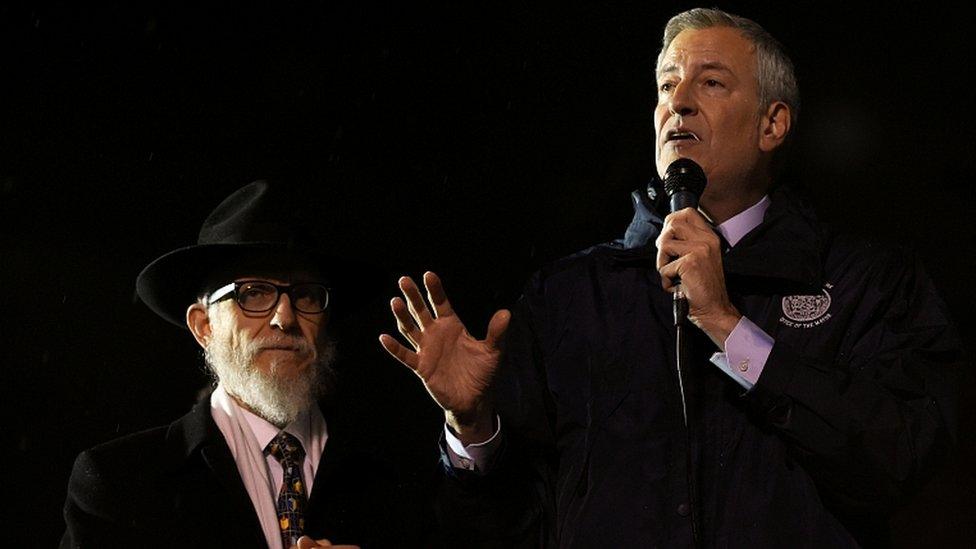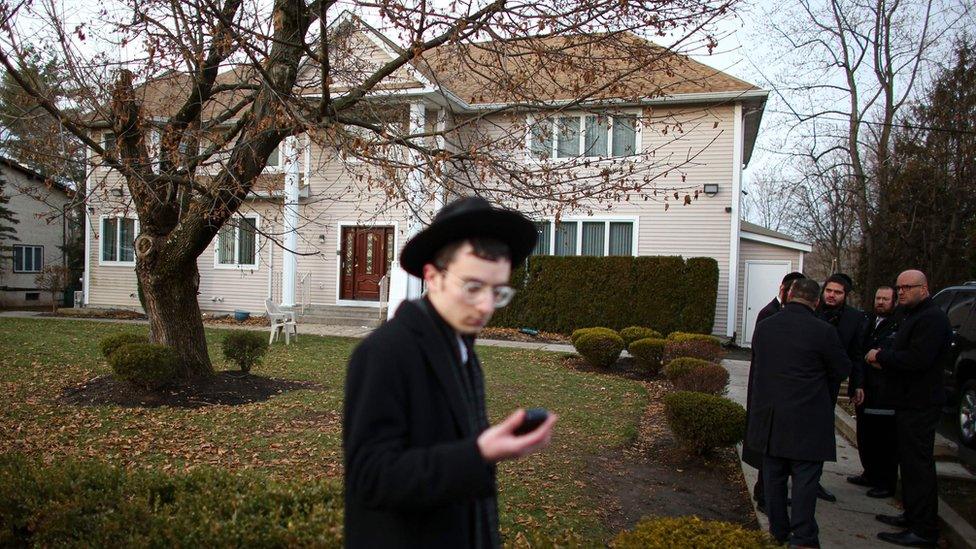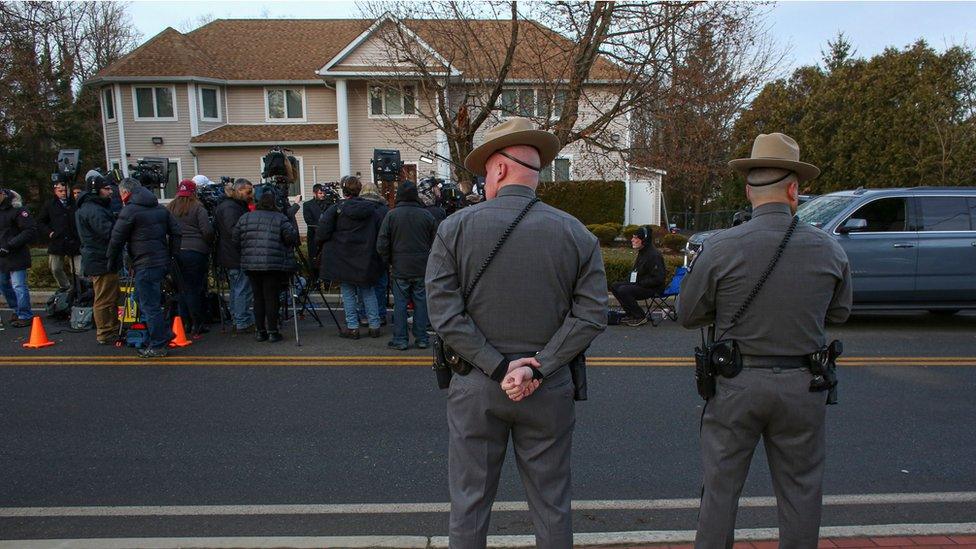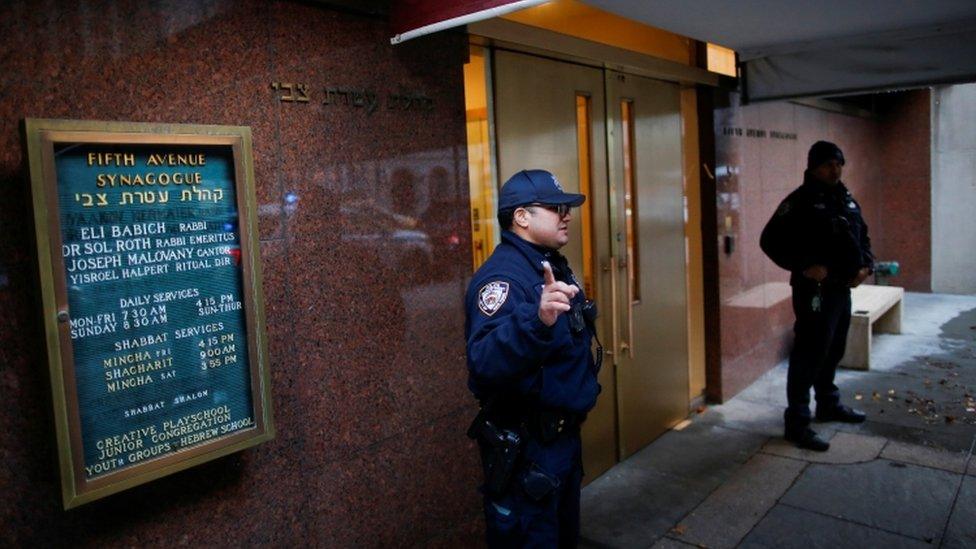Monsey stabbing: NYC mayor vows action on anti-Semitism 'crisis'
- Published
Grafton Thomas emerges from court after being charged
New York Mayor Bill de Blasio has announced a series of measures to tackle a "crisis" of anti-Semitic attacks, following a mass stabbing.
Mr de Blasio said security would be stepped up in Jewish areas and schools would teach students to tackle hate.
At least five people were injured in the knife attack at a rabbi's house in New York state on Saturday.
President Donald Trump called for unity to fight "the evil scourge" of anti-Semitism following the attack.
Witnesses said the attacker burst into the house in Monsey, north of New York City, which was hosting a Hanukkah celebration, pulled out a large knife and began stabbing people.
The suspected knifeman, named by police as Grafton Thomas, 37, of Greenwood Lake, New York, has been charged with attempted murder. He pleaded not guilty, and is being held in jail with his bail set at $5m (£3.8m).
On Sunday night, his lawyer Michael Sussman issued a statement on behalf of his family which said Mr Thomas "has a long history of mental illness and hospitalisations".
"He has no history of like violent acts and no convictions for any crime," it said. "He has no known history of anti-Semitism and was raised in a home which embraced and respected all religions and races. He is not a member of any hate groups."
What did the mayor say?
Just a day before the attack, Mr de Blasio had announced extra police patrols in three areas of Brooklyn with large Jewish populations following a spate of anti-Semitic incidents.
"The spirit we bring today is one of resolve and relentlessness. We will keep adding as many measures as it takes to end this crisis," he told reporters on Sunday.
Mr de Blasio said additional officers would now be deployed to the districts of Williamsburg, Crown Heights and Borough Park.

New York City Mayor Bill de Blasio (R) said authorities had to act decisively
"People in the community will see our officers present in front of houses of worship and out on the streets. We have to give people a sense of security, and we have to show that this horrible trend we've seen over the last weeks will be stopped dead in its tracks," he said.
Mr de Blasio said changes would be made to the curriculum at schools in Brooklyn starting from next month. He said they would focus on "stopping hate... on building mutual respect, to help young people understand what hate crimes really mean and the dangers they pose to all of us".

The attack took place during a religious celebration inside a rabbi's house
What happened?
A man brandishing a machete attacked a Hanukkah celebration at the rabbi's property in Monsey - an area with a large population of ultra-Orthodox Jews. The incident happened at about 22:00 on Saturday (03:00 GMT Sunday).
Rabbi Yisroel Kahan, who was in the house at the time, described the moment the attack began.
"He pushed his way in, slammed the door shut and said 'None of you getting out of here' - something to that effect, nobody's leaving - and pulls out a machete and unsheathes it and starts doing the unthinkable," he said.
Yossi Gestetner, a co-founder of the Orthodox Jewish Public Affairs Council for the Hudson Valley region, told the New York Times that the assailant had his face partially covered by a scarf and that the rabbi's son was one of those he wounded.
Aron Kohn, 65, who was also in the house at the time, told the paper: "I was praying for my life. We didn't have time to react at all."

The rabbi's house was hosting a Hanukkah celebration
Mr Kohn said that the attacker then tried to enter a synagogue next to the house, but people inside had locked the door.
The man then fled in a car. His vehicle registration was passed to police and number-plate scanners picked up the car as it entered New York City, where he was detained.
Mr Thomas was charged on Sunday with five counts of attempted murder and one count of burglary, police said.
What are other New York authorities saying?
State Governor Andrew Cuomo described the attack as "domestic terrorism". Hatred based on race, colour and creed was an "American cancer spreading in the body politic", the governor told a news conference on Sunday.
He called for a domestic terrorism law in the state to prosecute such crimes.
"We were scared, but we were not surprised"
"Just because they don't come from another country doesn't mean they are not terrorists. They should be prosecuted as domestic terrorists."
"We are not going to let this poison spread. No-one else can defeat this country, but this country can defeat itself," he added.
What other reaction has there been?
President Trump said the attack was "horrific".
"We must all come together to fight, confront and eradicate the evil scourge of anti-Semitism," he said.
Allow X content?
This article contains content provided by X. We ask for your permission before anything is loaded, as they may be using cookies and other technologies. You may want to read X’s cookie policy, external and privacy policy, external before accepting. To view this content choose ‘accept and continue’.

In Israel, President Reuven Rivlin expressed his "shock and outrage" at the attack.
Steve Gold from the Jewish Federation in Rockland County said the US had failed the Jewish community.
"My parents were Holocaust survivors and my father made me promise to do what I can to make sure it never happens again. Today I can say I failed my father. The US has failed my parents and all Holocaust survivors. This cannot continue," he said.

Police in New York have been guarding synagogues following a spate of hate crimes
Are anti-Semitic attacks on the rise in the US?
On Friday New York city police's hate crimes unit said it was investigating eight anti-Semitic incidents reported since 13 December.
They included a threat by a man who walked into an Orthodox Jewish community organisation's headquarters in Brooklyn and threatened to shoot someone. In another incident a 30-year-old woman reportedly slapped three women in the face.
New York Police Department commissioner Dermot Shea has said hate crimes in New York City are up 22% this year.
"You see a swastika being drawn, you see a brick being thrown through a window, you see a woman walking down the street with her kids and having her wig ripped off," he said.
In April a gunman killed a female rabbi and wounded three people at a synagogue in San Diego.
That attack came exactly six months after the deadliest anti-Semitic attack in US history, when a gunman killed 11 worshippers at the Tree of Life synagogue in Pittsburgh.

Have you been affected by what's happened? Please get in touch by emailing haveyoursay@bbc.co.uk, external.
Please include a contact number if you are willing to speak to a BBC journalist. You can also contact us in the following ways:
WhatsApp: +44 7756 165803, external
Tweet: @BBC_HaveYourSay, external
Send pictures/video to yourpics@bbc.co.uk, external
Text an SMS or MMS to 61124 or +44 7624 800 100
Please read our terms of use and privacy policy